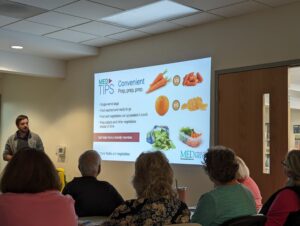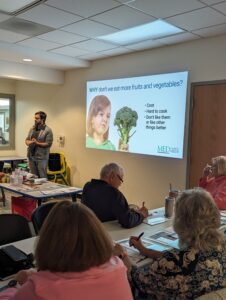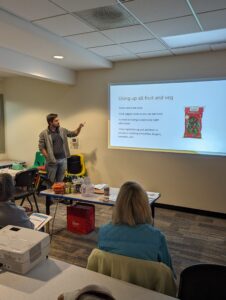More Veggies
go.ncsu.edu/readext?995642
en Español / em Português
El inglés es el idioma de control de esta página. En la medida en que haya algún conflicto entre la traducción al inglés y la traducción, el inglés prevalece.
Al hacer clic en el enlace de traducción se activa un servicio de traducción gratuito para convertir la página al español. Al igual que con cualquier traducción por Internet, la conversión no es sensible al contexto y puede que no traduzca el texto en su significado original. NC State Extension no garantiza la exactitud del texto traducido. Por favor, tenga en cuenta que algunas aplicaciones y/o servicios pueden no funcionar como se espera cuando se traducen.
Português
Inglês é o idioma de controle desta página. Na medida que haja algum conflito entre o texto original em Inglês e a tradução, o Inglês prevalece.
Ao clicar no link de tradução, um serviço gratuito de tradução será ativado para converter a página para o Português. Como em qualquer tradução pela internet, a conversão não é sensivel ao contexto e pode não ocorrer a tradução para o significado orginal. O serviço de Extensão da Carolina do Norte (NC State Extension) não garante a exatidão do texto traduzido. Por favor, observe que algumas funções ou serviços podem não funcionar como esperado após a tradução.
English
English is the controlling language of this page. To the extent there is any conflict between the English text and the translation, English controls.
Clicking on the translation link activates a free translation service to convert the page to Spanish. As with any Internet translation, the conversion is not context-sensitive and may not translate the text to its original meaning. NC State Extension does not guarantee the accuracy of the translated text. Please note that some applications and/or services may not function as expected when translated.
Collapse ▲Avery Ashley our Family and Consumer Science Extension Agent along with our
Extension Master Food Volunteers (EMFVs) recently conducted a very successful series of classes at the Rourke Library in Shallotte. The topic was the Mediterranean Diet, we call the program Med Instead of Meds because research has found that people who eat similar to those in the Mediterranean region tend to need less medications.

Avery Ashley, Family and Consumer Science Extension Agent, teaching a Med Instead of Meds class at the Rourk Library in Shallotte.
A key component of the Mediterranean Diet is eating lots of vegetables. They
recommend eating at least three cups of vegetables each day. Ashley discussed why people don’t eat more vegetables and outlined three things that could make help people eat more vegetables. These three things include making them: cost effective, convenient and craveable.
Cost Effective: Fresh vegetables can be expensive. Don’t be afraid to use canned or frozen if they more easily fit into your budget.
You do lose some heat degradable vitamins (Vitamin C and A) with canned products. And many canned products have added sodium—but they are cheaper and ready-to- eat. The price may be the trade-off.
Buy vegetables on sale or in season. Look at local markets for fresh vegetables that
haven’t traveled far to get to there. In season there were be more availability so the
prices should be lower.
While there are pros and cons of purchasing organic vegetables, don’t let the price of organic hold you back from buying vegetables. Eating any vegetable is better for your health—no matter if it’s organic or not.
Also think of your health care costs and the cost of medications. If you can stay
healthier or reduce the amount of medication you’re taking, the price of the vegetables may be worth it.
Convenient: Canned and frozen vegetables may also be more convenient because they are ready-to-eat and will keep for a long time compared to fresh. Keeping a supply of these on-hand can allow you to easily add them to any meal.
Frozen vegetables may actually be healthier than fresh—it all depends upon how long it took the fresh vegetables to get to the store and how long you’ve kept them in your refrigerator. Frozen vegetables are usually processed within hours of being picked, so they do maintain most of their nutrients.
If you can afford it, you can purchase already prepped vegetables. This includes bagged lettuce and other greens. Some local stores offer other vegetables spiral cut vegetables or cleaned and cut into ready-to-use pieces. The concept here is, if they’re convenient you might use them more.
Do-it-yourself. When you get fresh vegetables home from the market. Clean and prep them right away. Put them in recipe-sized or serving-sized bags. This may make it easier to grab and eat or put into a recipe.
Craveable: One of the major reasons many people say they don’t eat more vegetables is that they “just don’t like them”. Variation can be the key to liking vegetables. Ashely suggested looking for different recipes to find vegetables that you like so you’ll want to eat them.
Browning a vegetable can make it taste good and be more craveable. One way to do this is roasting in a very hot oven or an air frier. The water from the vegetables needs to evaporate a little to get that brown color. This is important when doing stir-fry, too.
Look for spices or seasoning blends that can add flavor to the vegetables. You can also add flavors with seasoned oils.
Ashely encourages more salads. He tries to have one at every meal. This doesn’t have to be a traditional salad. Be creative and use what’s in the fridge—maybe last night’s leftover roasted veggies, add grated raw zucchini or a canned or pickled vegetable.
Making your own dressings can add a spark to these salads and you can be versatile and add flavors of your choice and make you want to eat more of them.
If you missed the class in Shallotte, but want to learn more about Med Instead of Meds, we’ll be offering another session at the Southwest Brunswick Library in Calabash. The four-part series will be held Fridays May 3, 10, 17 and 24 from 1- 2:30 p.m. You can sign up on the library’s website. These classes are free of charge. There is limited seating.
Syracuse is a Family and Consumer Science team member and can be reached at N.C. Cooperative Extension, Brunswick County Center 910-253-2610 or by email at clsyracu@ncsu.edu





